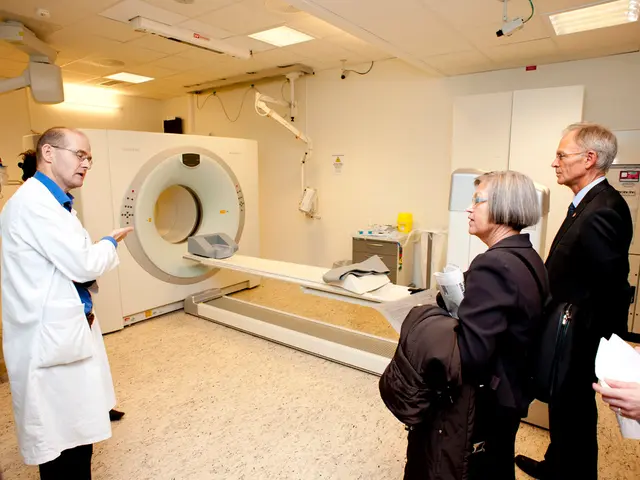Exploration of Therapeutic Strategies for C3 Glomerulopathy (C3G)
Kickin' It with C3 Glomerulopathy (C3G): Breakin' Down the Latest Treatments and Future Therapies
C3 Glomerulopathy (C3G) is a rare kidney condition that affects roughly 2-3 out of every million people. This disease arises due to an overactive immune system, causing protein deposits to build up in the kidney's filtering tissues, eventually impairing their function and potentially leading to kidney failure.
As there's no cure for C3G, current treatment strategies focus on supporting kidney health and suppressing the immune system. Here's a lowdown on the current game plan and what's on the horizon for C3G treatment.
The Here and Now: Treatin' C3G
The immune system's suppression is crucial in managing C3G. New and emerging treatments strive to interfere with the proteins responsible for disease activity.
- ACE inhibitors and ARBs: These medications help lower blood pressure and prevent protein leakage in the kidneys, known as proteinuria.
- Immunosuppressive therapies: Medications like mycophenolate mofetil (MMF) and glucocorticoids, which suppress the immune system, are recommended when a person experiences declining kidney function for at least 6 months or displays other signs of condition progression.
- Complement inhibitors: These medications, such as eculizumab and ravulizumab, halt complement system activity and may be suggested if traditional immunosuppressant medications fail to slow kidney damage.
Dietary Tips: Keepin' Kidneys Healthy
Following a kidney-friendly diet can help ease the burden on your kidneys. Aim for a diet that:
- Reduces levels of sodium, potassium, and phosphorus
- Balances protein and healthy fat levels
- Regulates fluid intake
Some people may benefit from working with a dietitian to develop a personalized meal plan that supports kidney health without compromising nutrition.
The Future's Bright: Emergin' Treatments on the Horizon
Researchers are virtually dance-offin' in their quest to create effective treatments for C3G by focusing on different parts of the complement system. These potential breakthroughs aim to disrupt the cascade of events leading to C3G activity.
Some up-and-coming medications include:
- Pegcetacoplan, pegged for FDA approval soon, targets C3/C3b and shows promise in reducing proteinuria, stabilizing kidney function, and clearing C3c deposits.
- ARO-C3, currently in various stages of clinical trials, focuses on C3.
- Danicopan, aimed at factor D in the complement pathway, is in development.
- Avacopan, honing in on C5a, is under investigation.
- KP104, a dual-sided fighter targeting C3 and C5, aims to block multiple steps in the complement cascade.
- Narsoplimab, slated to inhibit MASP-2, plays a role in the lectin pathway of complement activation.
ADDITIONAL ENRICHMENT INSIGHTS:
Approved Treatment:
- Iptacopan: Approved by the FDA in March 2025, iptacopan is the first treatment specifically for C3G. It inhibits the alternative complement pathway by targeting factor B, thus addressing the underlying cause of the disease[1][3].
Emerging Therapies:
- Pegcetacoplan: Currently under FDA Priority Review, pegcetacoplan targets C3/C3b and has shown promising results in reducing proteinuria, stabilizing kidney function, and clearing C3c deposits in clinical trials[4][5].
- ARO-C3: This treatment targets C3 and is in various stages of clinical trials[2].
- Danicopan: Targets factor D in the complement pathway and is in development[2].
- Avacopan: Focuses on C5a, a component of the complement system, and is under investigation[2].
- KP104: Dual-targets C3 and C5, aiming to block multiple steps in the complement cascade[2].
- Narsoplimab: Inhibits MASP-2, which plays a role in the lectin pathway of complement activation[2].
- Iptacopan, approved by the FDA in March 2025, becomes the first treatment specifically tailored for C3G, inhibiting the alternative complement pathway by targeting factor B, thus addressing the root cause of the disease.
- In addition to iptacopan, researchers are progressing with various therapies that target different components of the complement system.
- Pegcetacoplan, currently under FDA Priority Review, zeroes in on C3/C3b and exhibits promising results in reducing proteinuria, stabilizing kidney function, and clearing C3c deposits as demonstrated in clinical trials.
- ARO-C3, a treatment that focuses on C3, is undergoing various stages of clinical trials.
- Danicopan, aimed at factor D in the complement pathway, is still in development.
- Avacopan, which zeroes in on C5a, a component of the complement system, is under investigation.
- KP104, a dual-targeted therapy addressing both C3 and C5, aims to block multiple steps in the complement cascade.
- Narsoplimab, intended to inhibit MASP-2, plays a significant role in the lectin pathway of complement activation and is under consideration.
- Despite advancements in C3G treatments, it's important to prioritize overall health and wellness, including mental, men's, women's, skin, cardiovascular, and fitness and exercise.
- Maintaining a healthy lifestyle can help manage chronic diseases, such as kidney disease, cancer, respiratory conditions, digestive health issues, and neurological disorders, as well as common skin conditions.
- Prioritizing a well-rounded diet that emphasizes nutrition, while managing weight, is crucial for healthy aging, parenting, and eye, hearing, and sexual health.
- Workplace wellness programs that promote health and wellness, particularly for employees managing medical conditions and chronic diseases, can play a vital role in maintaining a person's work performance and overall well-being.
- Therapies and treatments for various health concerns frequently include medication, lifestyle changes, and even alternatives, such as CBD, depending on the specific condition.
- As we continue to unravel the complexities of C3G and find more effective treatments and therapies, it's essential to remember the importance of preventive measures, regular medical check-ups, and maintaining overall health and wellness.








